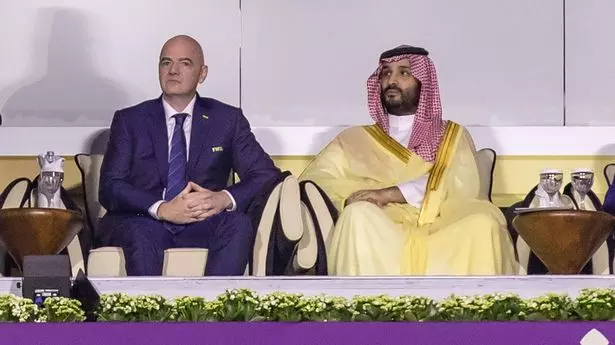
Saudi Arabia’s intent to host the 2034 FIFA World Cup has generated extensive discussions about the growing influence of the Middle Eastern nation in the realm of global sports, and how FIFA’s evolving landscape is facilitating these ambitions.
The Road to 2034: Saudi Arabia’s World Cup Bid
Just a short while after the curtains fell on the World Cup in Qatar, whispers began circulating about Saudi Arabia’s aspiration to follow suit. These murmurs soon grew into assertive statements, and, in what felt like an overnight shift, it was nearly confirmed: Saudi Arabia would host the World Cup in 2034.
While the nation has officially expressed its interest, its bid is effectively unopposed. With support from the Asian Football Confederation and over 100 FIFA member countries, it’s evident that Saudi Arabia is not just in the race, it’s leading it. Gianni Infantino, FIFA’s president, further underlines this sentiment with his overt enthusiasm for Saudi Arabia’s sports trajectory. His recent presence in Riyadh, not for football, but for an esports event, is a testament to this growing camaraderie.
The Strategic Shift in FIFA’s Bidding Process
At the core of Saudi’s near-certain World Cup gig is a pivotal change in FIFA’s approach to hosting decisions. An October meeting of the FIFA council hinted at a novel strategy, altering long-standing bid timing rules. These adjustments effectively guaranteed that either Asia or Oceania would secure the 2034 hosting rights.
FIFA’s New Rotation Policy: Bidding Landscape
| Year | Host Region |
| 2026 | North America (USA, Canada, Mexico) |
| 2030 | TBD |
| 2034 | Asia/Oceania |
The immediacy with which Saudi Arabia’s success was signaled surprised many. Furthermore, major football decision-makers, like the UEFA president and the chair of the English FA, only learned of these groundbreaking changes a mere week before their approval. Yet, despite this abruptness, the revisions garnered support without notable public opposition.
Australia’s reaction serves as a case in point. Although long-rumored to co-host the 2034 event with Indonesia, they withdrew upon facing a swift 25-day decision deadline. However, the land down under isn’t leaving empty-handed. It’s now a frontrunner to host FIFA’s revamped Club World Cup in 2029.

Balancing Football’s Ethos and Global Ambitions
The prominence given to Saudi Arabia’s desires might appear as a deviation from football’s cherished principles, such as transparency, accountability, and human rights advocacy. Yet, it could also be viewed as football’s evolution into a truly global sport, in line with Infantino’s vision.
The Qatar World Cup underscored this evolution. The football world had to grapple with cultural nuances, from beer bans to LGBTQ+ rights considerations. With the World Cup potentially returning to the Gulf, and to Saudi Arabia, where the stakes on such issues are even higher, European countries will be closely observed. Will they address these concerns or sidestep them for the love of the game?
The Impending Impact of the Saudi World Cup
For football and FIFA, Saudi Arabia’s World Cup might usher in extensive Saudi investment. Whether through sponsorships or more Memorandums of Understanding (MOUs), the implications are vast.
Potential Benefits for Saudi Arabia
- Tourism Boost: The World Cup is a global attraction, drawing fans from every corner.
- National Unity: Sports have a unique power to unite people across diverse backgrounds.
- International Relations: Engaging with countries on the sporting front can aid diplomatic relations.
Yet, the overarching question looms: What’s in it for Saudi Arabia? The answer remains multifaceted and, to an extent, speculative. Their sporting ambitions are evident, but they’re part of a more comprehensive strategy orchestrated primarily by Crown Prince Mohammed bin Salman.
In a recent statement, Prince Mohammed expressed his belief in sports as a GDP booster. But history suggests that mega sporting events might not be the golden ticket for economic leaps. Particularly for Saudi Arabia, infrastructure is a challenge. Even after FIFA lowered stadium requirements, the nation must construct 10 more stadiums to meet the prerequisites.
In summary, Saudi Arabia’s near-certain World Cup 2034 hosting is emblematic of its surging influence in global sports. The exact implications of this monumental event, both for the kingdom and the footballing world, will unfold with time.































